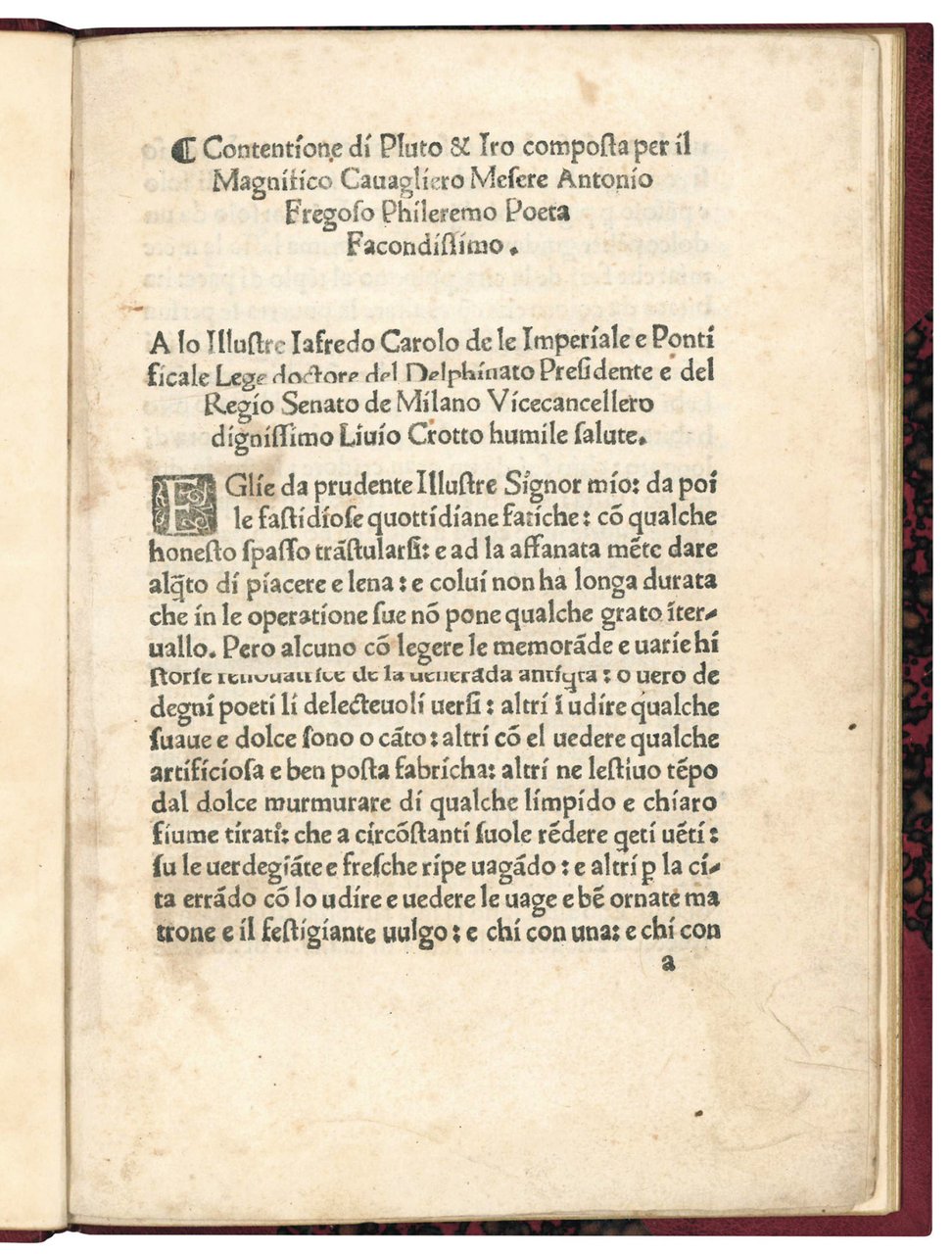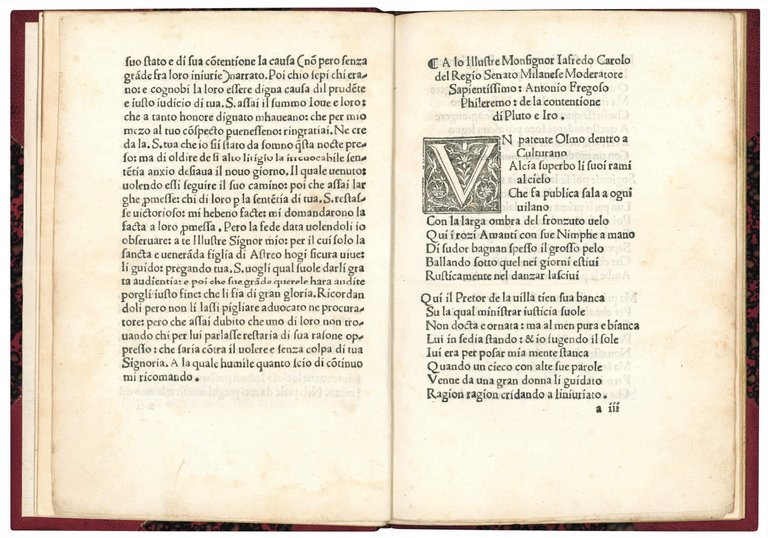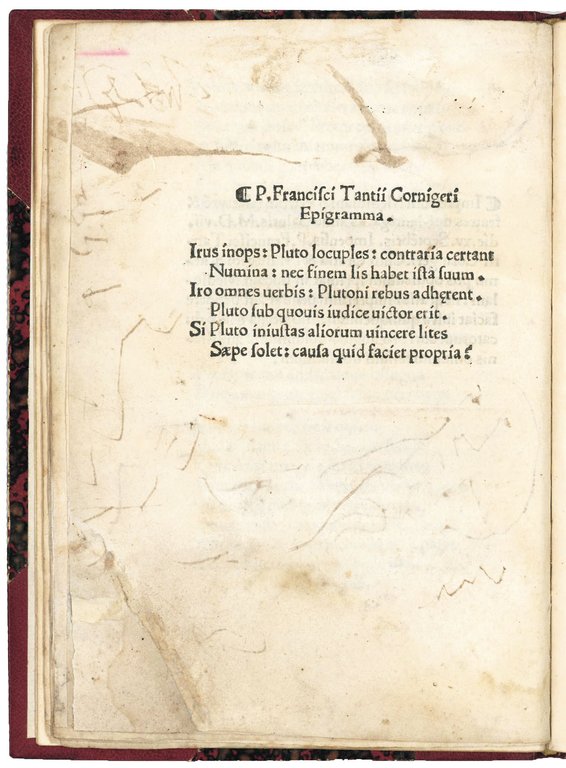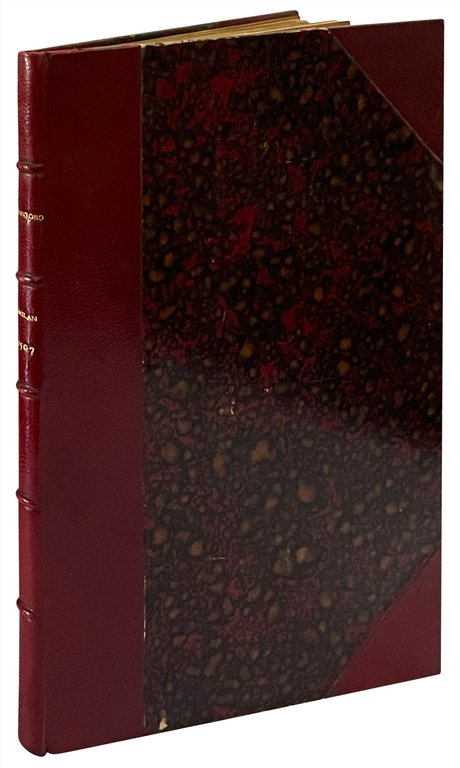



Livres anciens et modernes
FREGOSO, Antonio (ca. 1460-ca. 1530)
Contentione di Pluto & Iro composta per il Magnifico Cavagliero Mesere Antonio Fregoso Phileremo Poeta Facondissimo. Colophon: Impressum Mediolani p[er] Petrum Martyre[m] & fratres de Mantegatiis anno Salutis M.D.vii. die. xv. Septe[m]bris Impensis. P. Francisci Tantii Cornigeri
Pietro Martire Mantegazza & brothers for Francesco Tanzi, 1507 (15 September)
4800,00 €
Govi Libreria Antiquaria
(Modena, Italie)
Les frais d'expédition corrects sont calculés une fois que l'adresse de livraison a été indiquée lors de la création de la commande. Un ou plusieurs modes de livraison sont disponibles à la discrétion du vendeur : standard, express, economy, in store pick-up.
Conditions d'expédition de la Librairie:
Pour les articles dont le prix est supérieur à 300 euros, il est possible de demander un plan de paiement échelonné à Maremagnum. Le paiement peut être effectué avec Carta del Docente, Carta della cultura giovani e del merito, Public Administration.
Les délais de livraison sont estimés en fonction du temps d'expédition de la librairie et de la livraison par le transporteur. En cas de retenue douanière, des retards de livraison peuvent survenir. Les frais de douane éventuels sont à la charge du destinataire.
Pour plus d'informationsMode de Paiement
- PayPal
- Carte bancaire
- Virement bancaire
-
-
Découvrez comment utiliser
votre Carta del Docente -
Découvrez comment utiliser
votre Carta della cultura giovani e del merito
Détails
Description
4to (199x135 mm). [10] leaves. Collation: a6 b4. Colophon at l. b4r. At the last leaf verso is an epigram by Francesco Tanzi. Woodcut decorative initials on black ground. Early 20th-century half morocco, gilt title on spine (Wood, London). On the front pastedown armorial bookplate “Biblioteca di Casate Vecchio”. Marginal staining and light foxing, pale ink stain to the outer margin of the last five leaves, outer corner of the final leaf repared not affecting the text, old pen scribbles on the last leaf. A wide-margined copy from the libraries of Giuseppe Cavalieri (cf. T. De Marinis, ed., Catalogue des livres compasant la bibliothèque de M. Giuseppe Cavalieri à Ferrara, Florence, 1908, no. 784) and the bookseller Giuseppe Martini (with his typical pensil notes on the flyleaves, cf. E. Barbieri, ed., Da Lucca a New York a Lugano: Giuseppe Martini libraio tra Otto e Novecento, Florence, 2017), who writes that the book had also belonged to Charles Fairfax Murray (1849-1919).
Extremely rare first and only edition of this poem in 41 octaves. The Contentione di Pluto & Iro (‘The Contention of Pluto and Irus') describes a dispute between Pluto, the god of wealth, and the beggar Arnaeus, or Irus. The contention ends without a winner and the two disputants are invited to seek the wise judgement of the President of the Milanese Senate, Iafredo Carlo, to whom the work is dedicated.
A unique case among Fregoso's works, the poem is also transmitted in a manuscript preserved today in the Biblioteca Ambrosiana in Milan, which however presents a more corrupted text than the printed edition; the latter in fact derives directly from the autograph that Fregoso himself probably entrusted to his friend Francesco Tanzi, the financer of the edition.
Antonio Fregoso (or Campofregoso or Fulgoso) Fileremo (or Filareno, i.e. lover of solitude) was probably born in Carrara, around 1460, the illegitimate son of Spinetta of the noble Genoese Fregoso family and lord of the city. Lacking male heirs, his father legitimised Antonio by an act later ratified by Emperor Frederick III. Spinetta, linked to the Duke of Milan Francesco Sforza, appointed in his will Cicco Simonetta as administrator of his estate and guardian of his son. After Spinetta's death in 1467, Fregoso lived with the latter in Milan. In 1472 Galeazzo Maria Sforza officially granted Milanese citizenship to Fregoso, but the following year Simonetta, as ducal minister, deprived him of Carrara and Lunigiana, which had passed to Federico Malaspina, rewarding him in exchange with the fief of Sannazzaro in Lomellina. In 1478, on the occasion of Gian Galeazzo Sforza's ducal appointment, Fregoso was made a knight. After a brief absence, he returned to Milan, where he married Fiorbellina Visconti di Lodrisio. In 1499 he swore allegiance to Louis XII when the latter conquered the Duchy of Milan, thus keeping his knighthood but losing the feud of Sannazzaro.
Fregoso then decided to retire to the villa in Colturano, on the road to Lodi, from where he sent his first works to Iafredo Carlo, president of the Milanese Senate. His retreat outside Milan did not, however, prevent him from frequenting the circles of Cecilia Gallerani and Ippolita Sforza Bentivoglio (as can be seen in the novelle I, 21 and III, 9 by M. Bandello). It is not clear what changes in Fregoso's life the succession in Milan of the Sforzas, French and Spanish after 1512 brought. He probably died around 1530. The fact that he is mentioned among the poets in the 1532 edition of L. Ariosto's Orlando furioso (XLVI, 16, v. 3 ff) does not serve to shift the terminus post quem since many of those mentioned in the poem were already dead at that date (V. De Matteis, Fregoso, Antonio Fileremo, in: “Dizionario Biografico degli Italiani”, vol. 50, Rome, 1998, s.v.).
Respectively in 1506 and 1507 Fregoso published two poems, the Riso di Democrito (“Democritus' Laughter”) and the Pianto di Heraclito (“Heraclitus' Weeping), each in fift

